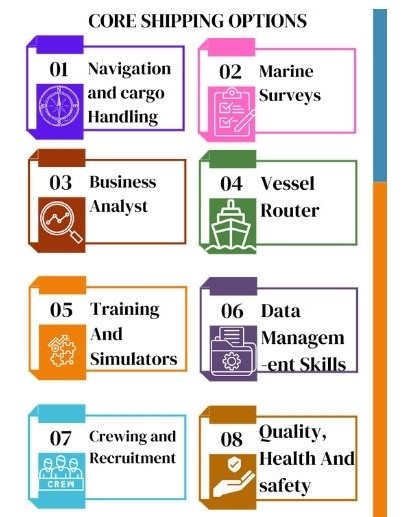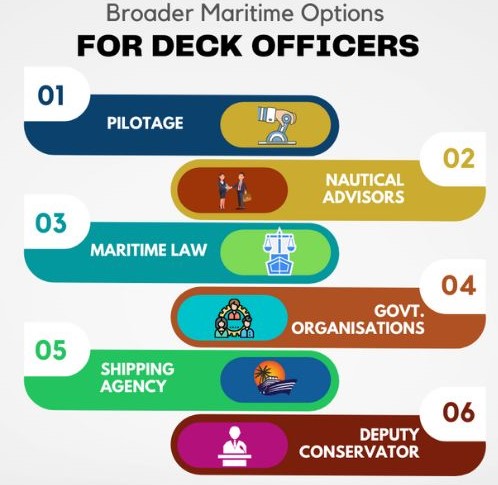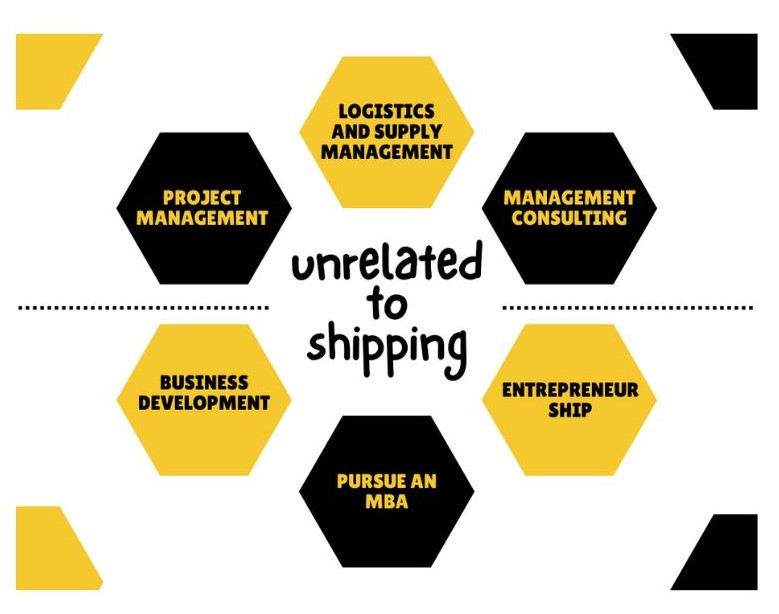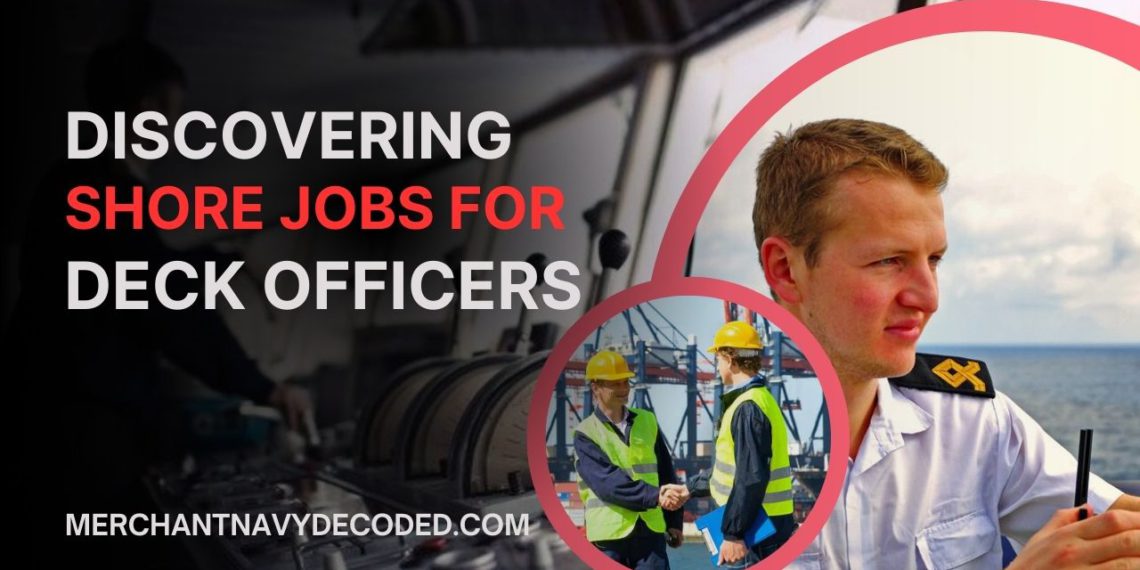Navigating Shore Careers For Deck Officers
Overview:
- Discover the Exciting World of Onshore Careers for Deck officers!
- From transferable skills to cutting-edge technology, find out why deck officers are the ultimate problem solvers and adaptable professionals.
- Navigate through various core, Broader and unrelated to shipping careers for Merchant Navy Officers.
What is a Merchant Navy Officer – Deck?
Deck officers are like captains and leaders on ships. They are responsible for making sure the ship goes in the right direction, handling cargo, and keeping everyone safe. But sometimes, these officers want to work on land instead of the sea. On land, they can do things like managing ship operations, helping ships find their way, working in shipping companies, or even using their skills in business and technology. So, the blog is about the different jobs deck officers can do on land when they’re not at sea.
Why should one consider an Onshore career?
More Time on Land:
Onshore careers let you spend more time with your family and friends because you won’t be away at sea for long periods.
Diverse Job Options:
There are many different jobs on land for people with maritime skills, like managing ships, working in shipping companies, or even using your knowledge in other businesses.
Stable and Safer:
Onshore jobs are often more stable, and you don’t have to deal with the dangers of the sea, making it a safer choice.
To gain a comprehensive understanding of the distinctions between merchant navy and onshore careers, you can review our earlier blog, which provides valuable insights into the reasons why onshore job opportunities are worth considering.
Options For Merchant Navy Officers in the Core Shipping Industry

Navigation and Cargo Handling:
- Deck officers with experience in navigation and cargo handling ensure ships travel safely and efficiently. They use charts and instruments to plot courses, avoiding obstacles like rocks or other ships.
- Cargo handling involves supervising the loading and unloading of goods, securing them properly, and ensuring they arrive in good condition.
Vessel Routing/Router/Assist the Ship Captain:
- These professionals help ships find the best and safest routes to their destinations. They consider factors like weather, traffic, and potential dangers at sea.
- They assist the ship’s captain by providing guidance and important information to make informed decisions during the voyage.
Commercial Shipping:
- Those in commercial shipping handle the administrative and logistical side of maritime operations. They deal with documents, customs, and other procedures when ships arrive at and depart from ports.
- They ensure everything runs smoothly for the ship and its cargo, coordinating various aspects of shipping operations.
Marine Surveys (Cargo, Navigation, Vessel):
- Marine surveyors inspect and assess ships, cargo, and navigation equipment. They identify and report on issues or damage, ensuring safety and compliance with regulations.
- Cargo surveyors assess the condition of goods during transport, while navigation and vessel surveyors inspect ships’ condition and equipment.
Business Analyst:
- Deck officers can transition into business analysis roles where they study and improve operational processes. They might develop tech solutions to streamline maritime operations.
- They analyze data and help make decisions that improve efficiency and productivity in shipping companies.
Training and Simulators (MTIs):
- In this role, deck officers become trainers or instructors at Maritime Training Institutes (MTIs). They pass on their knowledge and skills to the next generation of seafarers.
- They use simulators and practical training to prepare future sailors for their responsibilities at sea.
Data Management Skills:
- Deck officers skilled in data management handle information related to navigation equipment and ship operations. They ensure data is available to stakeholders.
- This role is about maintaining accurate records and providing valuable information to improve decision-making.
Quality, Health, and Safety (QHC):
- Professionals in QHC management ensure ships and maritime operations comply with safety and quality standards. They monitor and enforce safety procedures and regulations.
- Their work helps keep people and the environment safe in the maritime industry.
Crewing:
- Crewing professionals deal with the human side of shipping, handling crew recruitment, training, and scheduling. They ensure a well-functioning team on board.
- Good communication skills are essential for this role, as they involve managing the crew’s welfare and performance.
Options for Merchant Navy Officers in Commercial and Broader Maritime Domains

Pilotage:
Pilotage stands out as one of the most prominent and appealing career transitions for deck officers seeking to shift from sea to shore. It offers a seamless bridge between their extensive maritime experience and the world of onshore opportunities.
Role of Pilot:
- Pilotage involves guiding ships through challenging or narrow waterways, such as harbors or canals, to ensure safe navigation. Pilots are experts in local conditions and waterways.
- Deck officers can transition to pilot positions by gaining experience and local knowledge in specific areas. They assist ship’ captains in navigating complex routes, ensuring the safety of the vessel, crew, and cargo.
Deputy Conservator (Port Operations):
- Deputy Conservators oversee the efficient flow of goods through the port, ensuring smooth operations, safety, and compliance with regulations.
- They also deal with port infrastructure, budget management, and liaising with government authorities, making them central figures in port management.
Government Organizations (Maritime Boards, DG Shipping):
Opportunities within Government Organizations:
- Government organizations like Maritime Boards and DG Shipping offer opportunities for deck officers to work in roles related to maritime regulation, safety, and policy-making.
- These roles may involve contributing to the development of maritime policies, ensuring vessel safety and compliance, and working on maritime-related projects.
Expertise of Deck Officers:
- Deck officers’ practical knowledge of ship operations and safety is highly valuable in government roles. They can provide crucial insights into maritime regulations and standards.
- Deck officers may also take on roles as maritime inspectors, auditors, or advisors, ensuring that the maritime industry complies with safety and regulatory requirements.
Nautical Advisors:
- Nautical advisors offer guidance and expertise in matters related to maritime operations, safety, and navigation. Their role is to provide expert advice to ensure safe and efficient sea travel.
- Deck officers with extensive experience can transition into nautical advisory roles, where their maritime knowledge and expertise are essential in decision-making and problem-solving.
- Their guidance is especially valuable in complex navigation situations, where expert insights are necessary to avoid hazards and minimize risks.
Maritime Law:
- Deck officers interested in maritime law can become maritime lawyers or legal advisors. They use their understanding of maritime operations and regulations to provide legal counsel to shipping companies, insurers, or individuals.
- Maritime lawyers and legal advisors handle legal issues such as cargo disputes, environmental regulations, or accidents at sea. Their role is to ensure that maritime activities adhere to the law and to represent clients in legal proceedings.
- Deck officers who transition to maritime law roles bridge the gap between practical maritime experience and legal expertise.
Shipping Agencies:
Role of Deck Officers in Shipping Agencies:
- Deck officers can find roles in shipping agencies where they handle various tasks related to the arrival and departure of ships. They often deal with customs documentation, logistics, and coordinating ship activities.
- Their knowledge of ship operations and navigation makes them well-suited for ensuring efficient ship turnarounds and cargo handling.
- In shipping agencies, deck officers may be responsible for customs compliance, ensuring that all imports and exports meet regulatory requirements. They also coordinate the logistics of vessel arrivals and departures.
- Their involvement in customs clearance, cargo inspections, and coordinating with on-signers contributes to the smooth flow of goods through ports and harbors.
Discovering Jobs unrelated to shipping careers for Merchant Navy Officers

Project Management:
Diverse Application: Deck officers can transition into project management roles in various industries, such as construction, IT, healthcare, and more. Their skills in leadership, problem-solving, and organization are highly valuable in ensuring project success.
Managing Complex Tasks: Project managers oversee project timelines, budgets, and resources. Their ability to handle high-pressure situations and make critical decisions aligns with the dynamic nature of project management in different sectors.
Logistics and Supply Chain Management:
Efficient Goods Flow: Deck officers can excel in logistics and supply chain management roles, where they optimize the flow of goods from production to consumers. Their experience in cargo handling and transport planning is invaluable in ensuring timely deliveries.
Cost-Effective Operations: In logistics, professionals ensure that goods reach their destinations cost-effectively. Deck officers can apply their knowledge of cargo security and vessel routing to minimize costs and enhance supply chain efficiency.
Management Consulting:
Problem Solving: Transitioning to management consulting allows deck officers to work as advisors, helping businesses tackle challenges and improve operations. Their maritime background equips them with analytical and problem-solving skills that can be applied to various industries.
Strategy Development: Management consultants develop strategies to boost company performance. Deck officers can use their experience in navigating complex situations to craft effective strategies for clients in diverse sectors.
Entrepreneurship:
Business Ownership: Deck officers with a flair for entrepreneurship can start their own businesses, leveraging their maritime experience to establish ventures related to maritime services, safety, or technology.
Innovation: Entrepreneurship offers an opportunity to innovate and create solutions. Deck officers can develop new products or services that address maritime industry needs or explore entirely different markets.
Business Development:
Connecting Opportunities: Deck officers can thrive in business development roles, identifying and pursuing growth opportunities for companies in various sectors. Their ability to network and build relationships can open doors to new business partnerships.
Market Expansion: Business development professionals play a key role in expanding companies into new markets. Deck officers can apply their skills in negotiation and market research to drive business growth in diverse industries.
Pursue an MBA:
Broader Skill Set: While an MBA might not directly relate to deck officer work, it equips individuals with a broader skill set in leadership, management, and decision-making, which can be valuable in various careers.
Career Flexibility: An MBA offers the flexibility to explore different career paths. While direct maritime-related jobs may be limited, an MBA can open doors to a wider range of roles in various industries where leadership and management expertise are sought after.
Conclusion
In conclusion, the journey from sea to shore for deck officers is a testament to the versatility and adaptability of their skills and expertise. As we’ve explored throughout this blog, there’s a wide array of opportunities waiting on the horizon, offering exciting and rewarding career paths in various industries.
Whether it’s navigating the challenges of project management, optimizing the logistics and supply chain, shaping business strategies through management consulting, embarking on entrepreneurial ventures, fostering business development, or pursuing the broader horizon of an MBA, deck officers possess the resilience and leadership required to thrive on land.
If you are a Marine Engineer searching for options onshore, we have got you covered: Types of Shore Jobs for Marine Engineer
Disclaimer :- The opinions expressed in this article belong solely to the author and may not necessarily reflect those of Merchant Navy Decoded. We cannot guarantee the accuracy of the information provided and disclaim any responsibility for it. Data and visuals used are sourced from publicly available information and may not be authenticated by any regulatory body. Reviews and comments appearing on our blogs represent the opinions of individuals and do not necessarily reflect the views of Merchant Navy Decoded. We are not responsible for any loss or damage resulting from reliance on these reviews or comments.
Reproduction, copying, sharing, or use of the article or images in any form is strictly prohibited without prior permission from both the author and Merchant Navy Decoded.




In reality one should never join merchant Navy. Why l will give you reasons for it. No doubt doing studies and enrolling in merchant Navy is not easy . It involves lots of money and hard work. But worth nothing. After finishing the course you are supposed to do sailing . This means you need to board a ship. You are supposed to be paid for it. But in reality these agents charge you for on board training.You have to pay in lakhs to sail. Thus you have to shell out your hard earned money and work on the ship. Same step is repeated again and again.All the students have become agents and cheat you. You land up filling the pockets of these agents without earning a single money. Same is repeated when you excel or become third officer.So please don’t spend your hard earned money and time on this profession.You will end up ruined. For the world you are earning lakhs but in reality you are ruined. Only beneficiaries are the institutes and agents.Beware of this profession.Just stay away to avoid frustration .A well wisher.
Hi Mrs A, thankyou for bringing this in front of the seafarer community and aspirants. We appreciate that you have shared your views with us, however, not everything you said is correct either. Yes, there are some people who indulge in wrong practices and promises you to give you a job on ship, but if you take the right steps without any shortcuts then you won’t ever be required the help of these so called agents.
Check out this video to learn more about Merchant Navy Frauds and to help us spreading awareness regarding it:- CLICK HERE